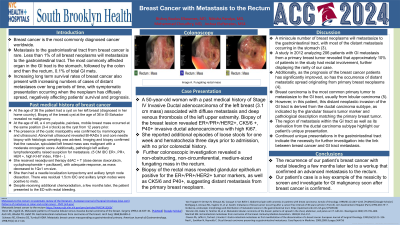Tuesday Poster Session
Category: Colon
P3699 - Breast Cancer with Metastasis to the Rectum
Tuesday, October 29, 2024
10:30 AM - 4:00 PM ET
Location: Exhibit Hall E

Has Audio

Bishoy Boulus Elkoumes, MD
NYC Health + Hospitals/South Brooklyn Health
Brooklyn, NY
Presenting Author(s)
Bishoy Boulus Elkoumes, MD1, Nikisha Pandya, MD2, Mohammad Choudhry, MD2, Joshua Elefteratos, 1
1NYC Health + Hospitals/South Brooklyn Health, Brooklyn, NY; 2South Brooklyn Health, Brooklyn, NY
Introduction: Breast cancer is the most commonly diagnosed cancer worldwide. Metastasis to the gastrointestinal tract from breast cancer is rare. Less than 1% of all breast neoplasms will metastasize to the gastrointestinal tract. The most commonly affected organ in the GI tract is the stomach, followed by the colon and then the rectum. Increasing long term survival rates of breast cancer also present with increasing numbers of cases of distant metastases over long periods of time, with symptomatic presentation occurring when the neoplasm has diffusely spread, negatively affecting patients’ survival and prognosis.
Case Description/Methods: Our case is a 50-year-old woman with a past medical history of Stage IV Invasive Ductal adenocarcinoma of the left breast (3.1 cm mass) associated with diffuse metastasis and deep venous thrombosis of the left upper extremity. She reported additional episodes of loose stools for one week and hematochezia three days prior to admission, with no prior colorectal history. Biopsy of the breast lesion revealed ER+/PR+/HER2+, CK5/6 +, P40+ invasive ductal adenocarcinoma with high Ki67. Further colonoscopic investigation revealed a non-obstructing, non-circumferential, medium-sized fungating mass in the rectum. Biopsy revealed glandular epithelium positive for the ER+/PR+/HER2+ tumor markers, as well as CK5/6 and P40+, suggesting distant metastasis from the primary breast neoplasm.
Discussion: Less than 1% of all breast neoplasms will metastasize to the gastrointestinal tract, with most of the distant metastasis occurring in the stomach. GI metastasis from a primary breast tumor is approximately 10% and of these patients had rectal involvement, further displaying the rarity of our case. Additionally, as the prognosis of the breast cancer patients has significantly improved, so has the occurrence of distant metastatic spread. Breast carcinoma is the most common primary tumor to metastasize to the GI tract, usually from lobular carcinoma (5). In this patient, this distant neoplastic invasion of the GI tract is derived from the ductal carcinoma subtype, as indicated by the glandular tissue’s tumor marker and pathological description matching the primary breast tumor. The region of metastasis within the GI tract as well as its derivation from the ductal carcinoma subtype highlight our patient’s unique presentation. Continued unique presentations in the gastrointestinal tract indicate the necessity for further investigation into the link between breast cancer and GI tract metastasis.

Disclosures:
Bishoy Boulus Elkoumes, MD1, Nikisha Pandya, MD2, Mohammad Choudhry, MD2, Joshua Elefteratos, 1. P3699 - Breast Cancer with Metastasis to the Rectum, ACG 2024 Annual Scientific Meeting Abstracts. Philadelphia, PA: American College of Gastroenterology.
1NYC Health + Hospitals/South Brooklyn Health, Brooklyn, NY; 2South Brooklyn Health, Brooklyn, NY
Introduction: Breast cancer is the most commonly diagnosed cancer worldwide. Metastasis to the gastrointestinal tract from breast cancer is rare. Less than 1% of all breast neoplasms will metastasize to the gastrointestinal tract. The most commonly affected organ in the GI tract is the stomach, followed by the colon and then the rectum. Increasing long term survival rates of breast cancer also present with increasing numbers of cases of distant metastases over long periods of time, with symptomatic presentation occurring when the neoplasm has diffusely spread, negatively affecting patients’ survival and prognosis.
Case Description/Methods: Our case is a 50-year-old woman with a past medical history of Stage IV Invasive Ductal adenocarcinoma of the left breast (3.1 cm mass) associated with diffuse metastasis and deep venous thrombosis of the left upper extremity. She reported additional episodes of loose stools for one week and hematochezia three days prior to admission, with no prior colorectal history. Biopsy of the breast lesion revealed ER+/PR+/HER2+, CK5/6 +, P40+ invasive ductal adenocarcinoma with high Ki67. Further colonoscopic investigation revealed a non-obstructing, non-circumferential, medium-sized fungating mass in the rectum. Biopsy revealed glandular epithelium positive for the ER+/PR+/HER2+ tumor markers, as well as CK5/6 and P40+, suggesting distant metastasis from the primary breast neoplasm.
Discussion: Less than 1% of all breast neoplasms will metastasize to the gastrointestinal tract, with most of the distant metastasis occurring in the stomach. GI metastasis from a primary breast tumor is approximately 10% and of these patients had rectal involvement, further displaying the rarity of our case. Additionally, as the prognosis of the breast cancer patients has significantly improved, so has the occurrence of distant metastatic spread. Breast carcinoma is the most common primary tumor to metastasize to the GI tract, usually from lobular carcinoma (5). In this patient, this distant neoplastic invasion of the GI tract is derived from the ductal carcinoma subtype, as indicated by the glandular tissue’s tumor marker and pathological description matching the primary breast tumor. The region of metastasis within the GI tract as well as its derivation from the ductal carcinoma subtype highlight our patient’s unique presentation. Continued unique presentations in the gastrointestinal tract indicate the necessity for further investigation into the link between breast cancer and GI tract metastasis.

Figure: Image A. Fungating rectal mass
Disclosures:
Bishoy Boulus Elkoumes indicated no relevant financial relationships.
Nikisha Pandya indicated no relevant financial relationships.
Mohammad Choudhry indicated no relevant financial relationships.
Joshua Elefteratos indicated no relevant financial relationships.
Bishoy Boulus Elkoumes, MD1, Nikisha Pandya, MD2, Mohammad Choudhry, MD2, Joshua Elefteratos, 1. P3699 - Breast Cancer with Metastasis to the Rectum, ACG 2024 Annual Scientific Meeting Abstracts. Philadelphia, PA: American College of Gastroenterology.
